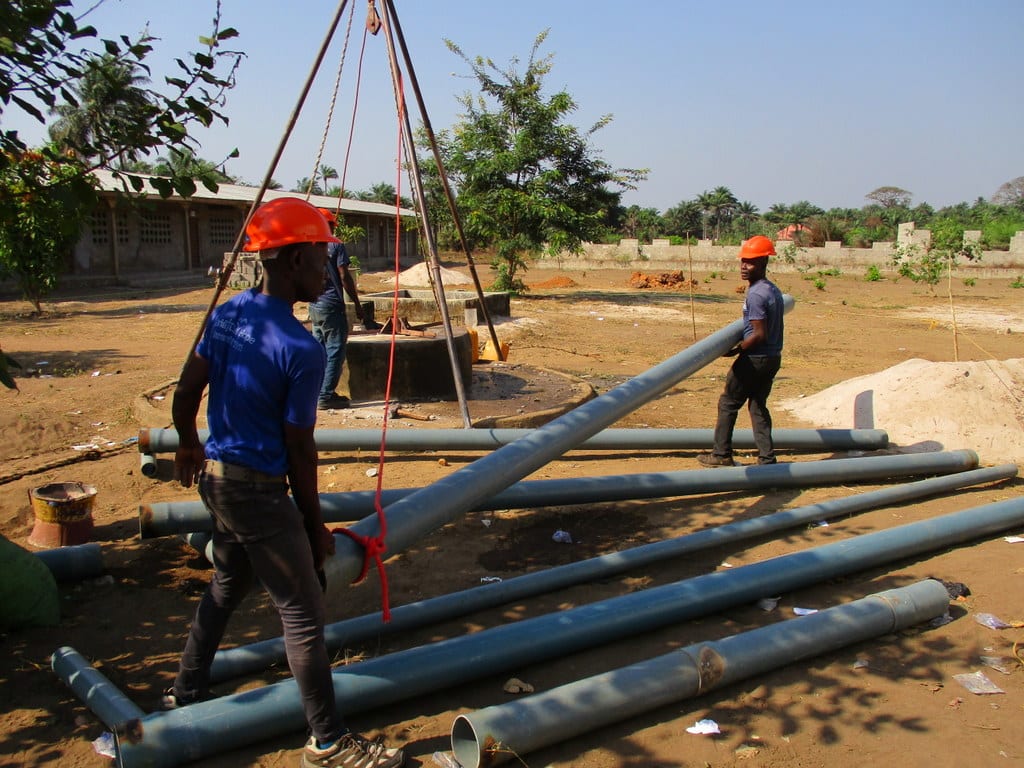The well at UBA Senior Secondary School currently has no pump. So the 1,100 students and local community members who use the well affixed a plastic container to a long rope for fetching water. They drop the bucket in the well, wait until it is full, pull it up, and finally empty its contents in their containers. The fact that it is an open source means that the water is unsafe for drinking.
To make matters worse, the well runs dry for months at a time.
As a result, some people in this part of the community turn to a different well we drilled for a neighboring community in Lungi Town. This well is perfectly maintained and clean. The caretaker is very strict about the sanitation of the well environment. It is a fantastic resource - for people living nearby. But it is a long walk for people who have homes near and for the students attending UBA Senior Secondary School. It also increases the number of people who use the other well, leading to long lines and greater stress on the water point as a whole.
Long queues are rife at the alternative source. So the kids will miss valuable lessons while they are away on a water-fetching trip.
"The kids always grumble about the distance to the well and they always ask about the quantity of water we use because they carry the burden of replenishing it when it runs out," said Aminata Sillah.
This reduces their grade averages at the end of the school year. The lack of water has health impacts on the students that cause some to miss class and others to lack the focus needed throughout the day.
The community also suffers a lot as a result of water scarcity. Late meals in homes are common because the housewives wait until kids come home from school to help with water. The state of hygiene and sanitation in households is largely undermined by the acute water shortage. It contributes to the high mosquito presence here and malaria infections among the people.
"In our own case in the community, we are honestly far from achieving average hygiene and sanitation status," Aminata said. "When we use the toilet we cannot clean ourselves better because we do not have enough water in our kulas (buckets)."
Here’s what we’re going to do about it:
Well Rehabilitation
The well on school grounds that is marked for this overhaul needs major work to supply adequate, clean water to the school and its neighbors year round. A hand auger will be lowered inside the well and powered by a drill team. This hand auger will allow the team to drill several meters deeper to hit a sufficient water column that will ensure the well supplies water throughout all seasons.
As the team drills, casing will be installed, transforming the bottom of this hand-dug well into a borehole. PVC piping will connect this lower system directly to the pump, a construction that we know will also improve the quality of water.
Once this plan is implemented, students within the school will have access to safe drinking water in both quality and quantity, even through the dry months.
Hygiene and Sanitation Training
There will be hygiene and sanitation training sessions offered for three days in a row.
After our visit, the hygiene and sanitation trainer decided it would be best to teach students and community members how to build a tippy tap (a handwashing station built with a jerrycan, string, and sticks). They will use these tippy taps for handwashing demonstrations, and will also teach about other tools like dish racks and the importance of properly penning in animals.
These trainings will also strengthen the water user committee that manages and maintains this well. They enforce proper behavior and report to us whenever they need our help solving a serious problem, like a pump breakdown.

 Borehole Well and Hand Pump
Borehole Well and Hand Pump




































